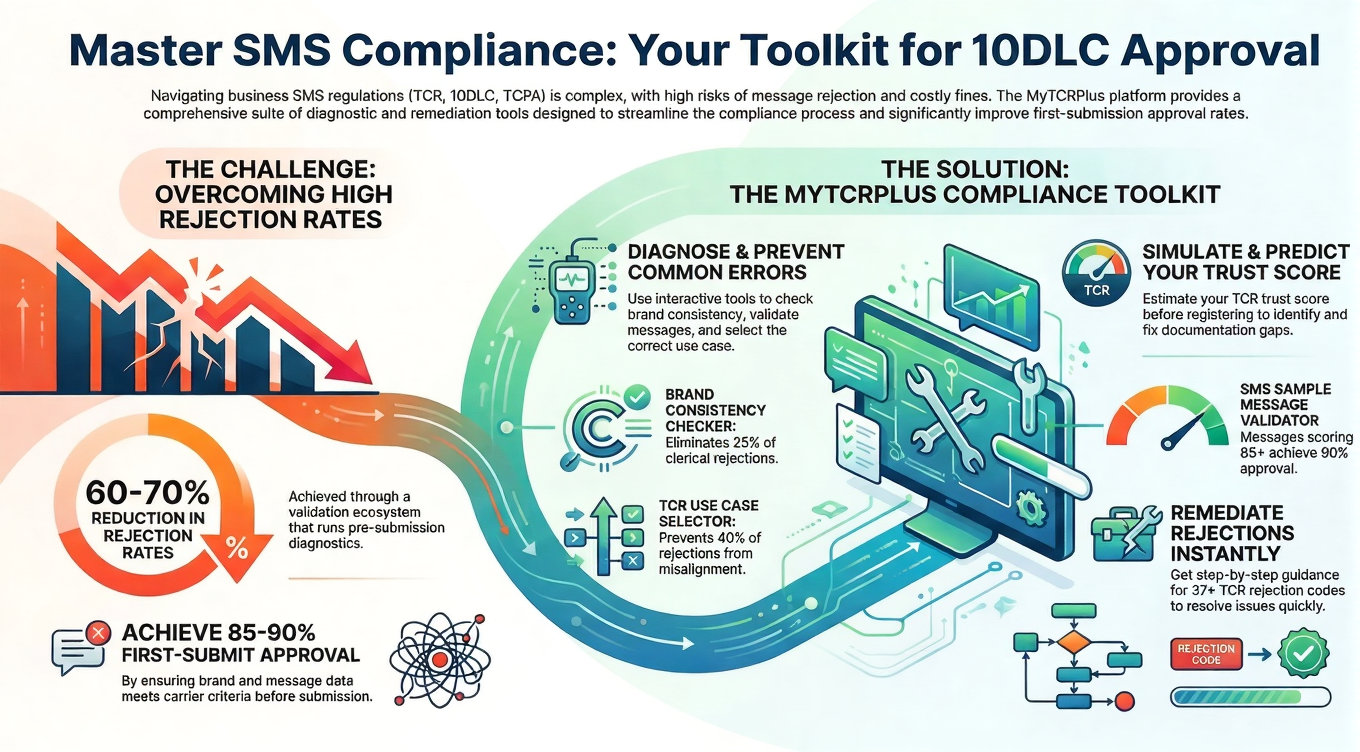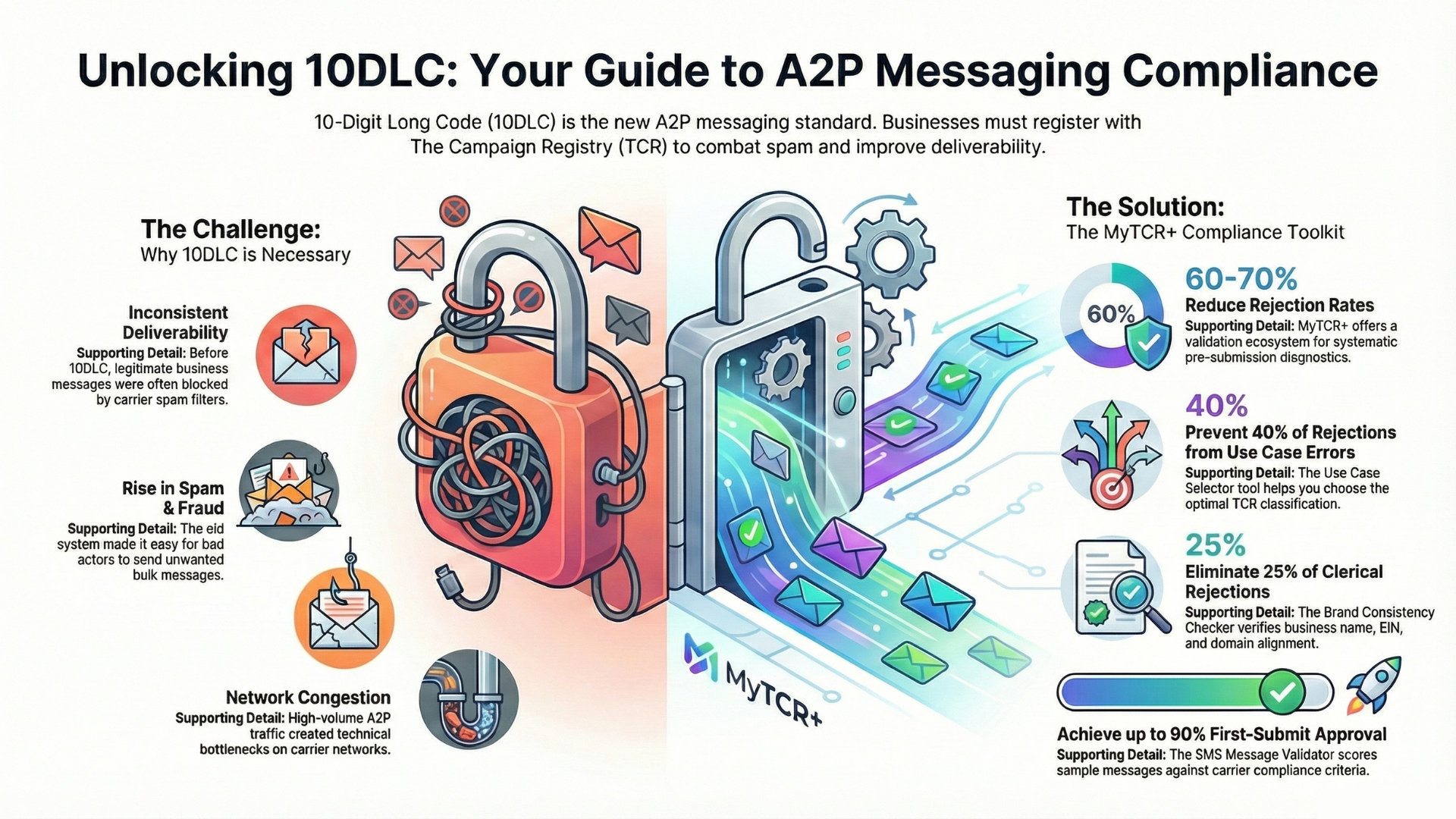The landscape of business text messaging has undergone a fundamental shift with the introduction of The Campaign Registry, commonly known as TCR. For companies that rely on SMS to communicate with customers, understanding TCR brand registration has transitioned from optional knowledge to essential compliance. This centralized system now serves as the gatekeeper for all commercial text messaging in the United States, fundamentally changing how businesses approach their SMS strategies.
The Genesis of TCR: Understanding Why Registration Matters
TCR brand registration was primarily established to address a growing problem that threatened to undermine text messaging entirely: spam. As businesses increasingly adopted SMS marketing, consumers found themselves inundated with unwanted messages, leading to decreased trust in the medium itself. The statistics painted a concerning picture—billions of unwanted messages were flooding consumer phones annually, creating frustration and eroding the effectiveness of legitimate business communications.
Wireless carriers needed a solution that would allow legitimate businesses to operate while filtering out bad actors. TCR emerged as that solution, creating a verification system that establishes business credibility before messages ever reach consumer phones. The system represents a collaborative effort between major wireless carriers, including AT&T, T-Mobile, and Verizon, who recognized that protecting the SMS ecosystem required industry-wide coordination rather than fragmented individual approaches.
This initiative wasn’t launched in isolation. The CTIA, the trade association representing the wireless communications industry, played a pivotal role in developing standards that balance business needs with consumer protection. The result is a framework that treats business text messaging with the same regulatory seriousness as other commercial communication channels, acknowledging SMS’s evolution from a personal communication tool to a critical business infrastructure.
Understanding the Brand Registration Process
The registration process begins with brand vetting, where businesses submit comprehensive information about their organization. This includes basic details like the legal business name and tax identification numbers, but also extends to operational information that helps establish legitimacy. Companies must provide their physical business address, industry classification, business structure, and contact information for responsible parties within the organization.
TCR assigns each registered brand a trust score based on factors including business age, public records, and verification level. This scoring system directly impacts messaging capabilities, with higher-scored brands enjoying greater message throughput and better deliverability rates. The trust score operates on a scale, with scores ranging from low to high based on the verification tier chosen and the business’s established credibility in public records.
Businesses can choose between several verification levels, each offering different benefits and requiring different levels of documentation. Standard verification provides baseline access and involves automated checks against public business databases. This option works well for established businesses with strong public records but may result in moderate trust scores that come with some volume limitations.
External vetting represents a higher tier, where third-party services conduct more thorough verification of business legitimacy. This process typically involves human review of business documentation, verification of business operations, and assessment of the company’s digital footprint. Companies that undergo external vetting receive significantly higher trust scores, translating to better message deliverability and higher throughput capabilities.
The Mandatory Nature of Compliance
What makes TCR particularly significant is its mandatory nature. Unlike previous industry guidelines that businesses could sometimes navigate around, TCR registration is enforced at the carrier level. Unregistered businesses attempting to send commercial texts face immediate filtering or blocking. This represents a substantial shift in how wireless networks handle business messaging, placing compliance at the foundation of any SMS strategy rather than treating it as an afterthought.
The enforcement mechanism operates automatically within carrier networks. When a business attempts to send messages through a messaging service provider, the system checks for proper TCR registration before allowing transmission. Messages from unregistered senders are either blocked entirely or heavily filtered, often never reaching intended recipients. This creates an immediate business impact—companies cannot simply ignore registration requirements and hope for the best.
The timeline for compliance has evolved since TCR’s introduction, but carriers have made clear that registration isn’t optional for any business using A2P (Application-to-Person) messaging. Even companies sending relatively small volumes of transactional messages need proper registration. The only exceptions apply to person-to-person messaging, where individual phones send texts directly to other individuals without automated systems or business purposes involved.
Campaign Registration: Beyond Brand Verification
The practical implications extend beyond simply completing registration forms. Businesses must carefully document their messaging use cases, describing exactly how they plan to communicate with customers. Different message types require different campaign registrations, meaning a company sending both appointment reminders and promotional offers needs multiple approved campaigns. This granular approach provides carriers with clear visibility into messaging patterns, making it easier to identify and address violations.
Campaign registration requires businesses to specify the message flow, including sample message content, opt-in mechanisms, and opt-out procedures. Each campaign must demonstrate compliance with TCPA (Telephone Consumer Protection Act) requirements, proving that recipients have provided proper consent to receive messages. This documentation serves multiple purposes—it helps carriers understand legitimate messaging patterns, provides evidence of compliance efforts, and creates accountability for business practices.
The campaign approval process involves review by TCR and potentially by individual carriers. Some campaign types receive near-instant approval, particularly for straightforward use cases like two-factor authentication or account notifications. Other campaigns, especially those involving marketing or promotional content, may require more extensive review. Businesses should anticipate approval times ranging from a few minutes to several business days, depending on campaign complexity and verification status.
Different use cases fall into distinct campaign categories, each with specific requirements and limitations. Customer care campaigns, which facilitate support interactions, generally receive favorable treatment with higher volume allowances. Delivery notifications and account management campaigns similarly enjoy streamlined approval. Marketing campaigns face more scrutiny and may have stricter volume limitations, reflecting carriers’ desire to prevent spam while allowing legitimate promotional communications.
Trust Scores and Their Business Impact
Trust scores assigned during registration carry real business consequences. A company with a lower score might find its messages delayed or its daily volume restricted, directly impacting customer engagement. Message throughput—the number of messages a business can send per second or per day—varies dramatically based on trust score. Low-scored brands might face severe restrictions that make large-scale SMS campaigns impractical, while high-scored brands can operate with minimal constraints.
Deliverability represents another critical factor influenced by trust scores. Higher-scored brands see better inbox placement rates, with their messages more likely to reach recipients promptly and without filtering. Lower-scored brands may experience delays, with messages queuing for extended periods or facing increased scrutiny that leads to filtering. For time-sensitive communications like appointment reminders or delivery updates, these delays can severely diminish message effectiveness.
Conversely, businesses that invest in higher verification levels and maintain strong compliance records benefit from premium treatment, ensuring their messages reach customers promptly and reliably. The cost difference between verification tiers is typically modest compared to the business value of reliable message delivery. Companies serious about SMS as a communication channel find that investing in external vetting pays for itself through improved performance and reduced operational headaches.
Trust scores aren’t static. While the initial score stems from registration and verification choices, ongoing compliance behavior influences long-term standing. Businesses that maintain clean records, respond promptly to complaints, and demonstrate consistent adherence to best practices can improve their standing over time. Conversely, patterns of violations, consumer complaints, or suspicious messaging activity can damage trust scores, leading to reduced capabilities or even suspension.
The Cost Structure of TCR Registration
Understanding TCR’s financial implications helps businesses budget appropriately for compliance. Registration fees occur at multiple levels, starting with brand registration itself. Businesses pay an annual fee to register their brand, with costs varying based on verification level. Standard verification carries lower fees, while external vetting involves both TCR fees and charges from the third-party verification service.
Campaign registration adds another layer of costs. Each campaign requires its own registration fee, either as a one-time charge or recurring monthly fee, depending on the campaign type. For businesses running multiple campaigns across different use cases, these fees accumulate quickly. However, the costs remain relatively modest compared to the overall investment in SMS infrastructure and the business value derived from effective text messaging capabilities.
Some messaging service providers absorb certain TCR fees within their platform pricing, while others pass costs directly through to customers. Businesses should carefully review their provider’s fee structure to understand total compliance costs. Beyond registration fees, companies should also consider the potential costs of non-compliance—including blocked messages, customer service issues from failed communications, and possible regulatory penalties for operating outside established frameworks.
Working with Messaging Service Providers
For businesses new to SMS marketing or those updating existing programs, TCR registration demands careful attention and often professional guidance. The combination of technical requirements, compliance considerations, and ongoing fee structures creates complexity that can overwhelm organizations without dedicated expertise. Most businesses leverage messaging service providers (MSPs) who offer TCR registration as part of their platform services.
Quality MSPs guide businesses through the registration process, helping them choose appropriate verification levels, draft effective campaign descriptions, and navigate approval requirements. These providers maintain direct relationships with TCR and carriers, giving them insights into approval patterns and best practices that individual businesses might not possess. Their experience proves particularly valuable when applications face rejection or when businesses need to troubleshoot deliverability issues.
The MSP relationship extends beyond initial registration. These providers monitor campaign performance, alert businesses to potential compliance issues, and help maintain ongoing registration requirements. As regulations evolve and carrier policies change, MSPs keep their customers informed and compliant, reducing the burden on internal teams who may lack specialized knowledge in this area.
However, businesses should recognize that ultimate responsibility for compliance rests with them, not their service provider. Companies must ensure they understand TCR requirements, maintain proper consent records, and operate their campaigns within approved parameters. The MSP facilitates compliance but cannot substitute for a business’s own commitment to responsible messaging practices.
Best Practices for Successful Registration
Successfully navigating TCR registration requires attention to several key principles. First, businesses should begin the registration process well before they need to send messages. Approval times vary, and attempting to register at the last minute creates unnecessary stress and potential business disruptions. Starting early allows time for addressing any issues that emerge during review.
Documentation accuracy matters enormously. Applications with inconsistent information between business records and registration details face delays or rejection. Businesses should ensure their legal name, EIN, and address match official records exactly. Even minor discrepancies can trigger additional scrutiny or require resubmission, extending the approval timeline.
Campaign descriptions require careful crafting. These should clearly explain the messaging purpose, provide realistic sample messages, and demonstrate compliance with consent requirements. Vague or overly broad descriptions may face rejection, while excessively narrow descriptions might not cover the business’s actual messaging needs. Finding the right balance—specific enough to be credible, broad enough to be practical—helps ensure smooth approval.
Businesses should seriously consider external vetting for anything beyond minimal messaging needs. The improved trust score, higher throughput, and better deliverability typically justify the modest additional investment. Companies planning significant SMS initiatives or those operating in industries where timely message delivery is critical should view external vetting as standard practice rather than an optional upgrade.
The Ongoing Compliance Journey
However, the investment in proper registration pays dividends through reliable message delivery and reduced risk of communication disruptions. TCR brand registration represents more than just a bureaucratic hurdle—it reflects the maturation of business text messaging into a regulated, accountable communication channel where legitimate businesses can thrive while consumers receive protection from unwanted intrusions.
The landscape will continue evolving as carriers refine their policies and as new use cases emerge for business text messaging. Staying informed about these changes and maintaining flexible, compliant systems positions businesses for long-term success in this critical communication channel. Companies that embrace TCR requirements rather than viewing them as obstacles will find themselves better positioned to leverage SMS effectively while building customer trust through responsible practices.
For businesses that depend on SMS to reach customers, TCR registration isn’t just about compliance—it’s about building a sustainable, effective communication strategy that respects both regulatory requirements and customer preferences. The initial effort required for proper registration creates a foundation for reliable, professional business messaging that serves both company interests and customer needs for years to come.




